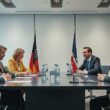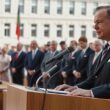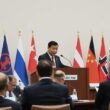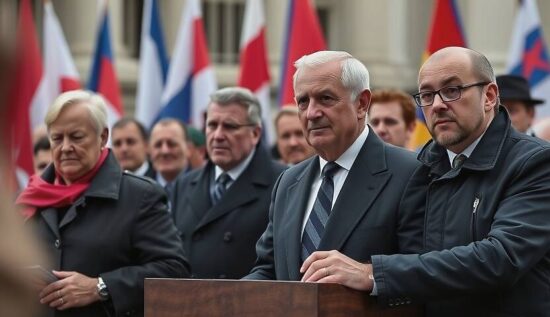French far-right party seeks respectability, adopts pro-NATO stance
The French far-right Rassemblement National (RN) party, often labeled as extreme right, is seeking respectability. It’s not a new strategy. The party has already abandoned its previous stance on the euro, despite its leaders once criticizing the principle of a single currency.
The RN’s development has accelerated in recent times, particularly since the summer when the party’s young leader, Jordan Bardella, believed he could become the next prime minister, only to be disappointed after the second round of the presidential election. Established parties agreed to “block” the RN, keeping it in opposition, despite the party now holding the largest faction in the National Assembly.
The RN’s MPs have been instructed to appear competent and responsible, even if they water down their previous demands. Meanwhile, the party has strengthened its connections with business circles.
The most significant and discreet development, however, is in international politics. Traditionally, the RN has been accused of being pro-Russian, with some of its leaders even defending the annexation of Crimea in 2014. Marine Le Pen, the party’s leader, received Russian President Vladimir Putin in Moscow in 2017, during her presidential campaign.
After Russia’s invasion of Ukraine in 2022, the party often spoke out against EU sanctions against Russia and condemned NATO’s support for Ukraine, blaming the Atlantic alliance for the conflict. This stance is now changing, particularly with Bardella’s growing influence and Le Pen’s focus on her future presidential campaign.
Bardella recently published a book, “Ce que je cherche” (What I’m looking for), to reaffirm his political identity, implying a break with the party’s previous line on Ukraine. He writes that many French people feared a Le Pen presidency would weaken the country’s position in the face of Putin’s expansionism.
Bardella’s words are almost a word-for-word adoption of the official NATO discourse, stating that the security of Europe is decided at the vast eastern flank, stretching from the Arctic to the Black Sea.
This discourse has the potential to charm the political elite in France and Europe. And, as if that were not enough, Bardella has entrusted one of his closest aides, Pierre-Romain Thionnet, with a dossier and sent him to the European Parliament’s Committee on Foreign Affairs, where Thionnet is advocating for the expansion of French military presence in Eastern Europe, particularly in Romania, as part of NATO’s support for Ukraine.
It is likely that not all party members are enthusiastic about this “upgrade.” However, it is on its way to taking hold, potentially sparking internal conflicts. The question remains whether this capitulation is driven by pure opportunism or a fundamental development.
Perhaps the original motivation was to avoid scaring off certain voter groups, but this tactical decision has gradually become a conviction, as it is repeatedly repeated and justified.
One factor in this development was likely the party’s increasing integration into European institutions, particularly the European Parliament, in a growing and structural manner. It is no coincidence that Jordan Bardella, who became an MEP at 24 in 2019, now cumulates the presidency of the RN with that of the Patriots for Europe group in the European Parliament.
Drawing parallels with the “transformation” of the French Communist Party (KPF) in the 1990s, which also underwent a deep and complex change, one can see a commonality with the current concessions of the RN: The desire to be active in Strasbourg and to influence the mechanisms of the community, justified in the name of the need to “change Europe from within.”
However, the opposite is true: the institutional mechanisms of the EU “absorb” the parties, making radical criticism disappear. This is done through meetings, structures, and community mechanisms that integrate the heads and actions – in the truest sense of the word – and thus strengthen the illusion of being able to influence the development of the European Union, while in reality, the party’s legitimacy is strengthened. And this, above all, thanks to the highly praised “culture of compromise” in Brussels and Strasbourg.
It is likely no coincidence that the most spectacular shifts are taking place in the field of international politics. In 1999, the KPF listed its candidates for the European elections with the name “Bouge l’Europe” (“Move, Europe”), featuring supporters of the war against Yugoslavia, and declared itself “euroconstructive.” A quarter of a century later, the RN is gradually adopting Atlantic theses and hopes to become acceptable to gain power in France.
The consequence for the KPF was that it practically lost all relevance on the political stage. The RN, however, is not yet at that point, but the same mechanism could be set in motion: if the party succeeds in becoming acceptable to the system, a significant part of its voter base might feel betrayed in the long run.





